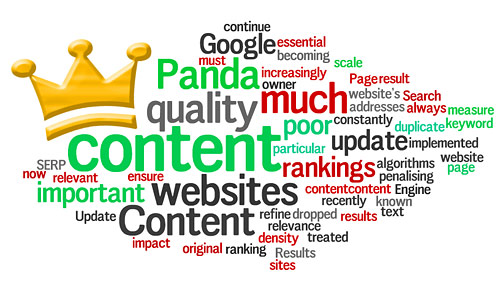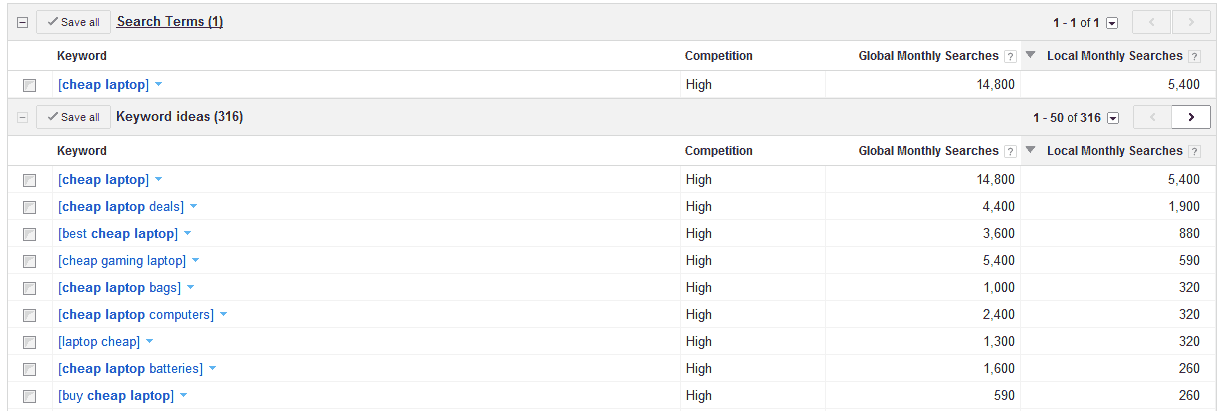Content is King...


High quality web site content has always been important. Now it's essential. As search engines, and Google in particular, continue to refine how they measure quality and relevance, your website’s content is more important than ever.
How Google Ranks Your Site - The Algorithm
Google is constantly revising its algorithms – the way it ranks websites on its results pages. The updates Google uses to implement these revisions have been given names that may be familiar to you – Panda, Penguin, Farmer. Some are wide ranging, others are just minor tweaks. Google's goal with all of this is to increase the number of good quality sites ranking highly on their SERPs (Search Engine Results Page) and reduce the number of poor quality sites. What this means is that websites which used to enjoy high page rankings but contained poor content are now being identified and penalised.
The algorithms themselves are a closely guarded secret, but Google does give hints about what they look for, and more importantly, what they penalise. So for example, poor quality content could be:
- Too little text
- High keyword density
- Too much duplicate content
- No original content
- Irrelevant content
In short, Google wants to give users more of what they want – high quality, relevant sites which answer their questions and deliver what they want: not over-optimised sites which don’t deliver.
So we have put together a short guide to help you with the ‘on-page optimisation’ of your website – what to include on your web pages to get them ranking in Google.
Content
"Give the readers what they want”
You need to look at the content of your web site and make it the best you possibly can. This means what you include should be new, original, interesting and, crucially, answers the questions of your target audience. You can't get away with simply copying or reproducing existing material – Google will see your site as a secondary source of little relevance and this will negatively affect your rankings.
Original
The good news is that your knowledge of your business, your product and your service is unique,which means you are in a strong position to produce that unique content. You know the answers to questions which you are probably asked continually by potential customers. This makes what you know invaluable. So if you can mine this knowledge and place it on your website, then you will be creating original content that will be of interest to potential customers, to other organisations, and crucially, to Google. This may be a little time consuming, but nothing beats genuine, first hand knowledge from real practitioners in any industry.
Google looks for content rich pages, but it also looks for content rich websites. This means you need to include enough on each page and across your website as a whole. In this case, less is not more, more is more. A website with 1,000 pages of high quality content will be more powerful and rank more highly than a website with 10 pages of high quality content
Relevant
Your content also needs to be relevant. That is, it needs to be specific to your own niche and areas of expertise, which are appropriate to your industry or sector and your target audience. This should be done at page level, as well as site level, so that each page deals with a separate niche of your business. The result will be a group of highly focused web pages, dealing with very specific content, that should provide users with exactly what they are looking for.
Current
Likewise, if you don’t update your site regularly with new material, search engines will lose interest in it and your rankings will fall. So high quality, relevant, informative material such as research, analysis and reporting is likely to have the most impact on your SERP rankings. This is because it is the type of content that others will like, share and then link to from their own websites. These ‘backlinks’ from quality sites are recognised by search engines as indicators of the quality and importance of your site, which will then be ranked accordingly.
Keywords
"People can overdo it to the point that we consider it keyword stuffing, and it hurts. I would just make sure you do it in natural ways where regular people aren’t going to find it stiff or artificial. That tends to be what works best"– Matt Cutts, Google
Effective
Google has always looked at what is on the page in terms of the relevancy of keywords. But Google now uses them in a different way. They are still very important, but optimisation is no longer as focused on how specific keywords and phrases are being used on a page.
Google has increasingly used “latent semantic phrases” as part of its algorithm. These are the synonyms of identified keywords, or, in other words, alternative search phrases. This is why you may find results pages which don’t contain any of the search terms you entered into Google – Google has taken your search and produced results related to what you are looking for, just without containing that specific phrase.
This does not mean you should abandon keywords completely. They are still a strong indicator of the terms and phrases most frequently used, and you still need to establish which are the most relevant and important for your website. But now, they need to be used in a more considered way, and may not even appear on the page itself.
In many ways, this is actually far more useful as it means you have a lot more flexibility in the words and phrases you can use when writing content. Previously, sticking to very specifically optimised phrases could cause problems of how to ‘naturally’ include an ‘unnatural’ string of words onto a page – there are many examples out there where this has been done badly. This is no longer an issue and means most people will find it easier to write good content.
You should still start with a list of good, relevant keywords when creating content, but they will remain just that – the starting point.
Relevant
There are a number of tools available to help you identify which are the best keywords to use, and which are likely to be the most effective for your website. Most notable is the Keyword tool in Google Adwords.
Google Adwords Keyword Tool
- Identifies the phrases real users type in which are most closely related to your business activity or product
- Indicates which keywords are most searched for
- Indicates how much competition there is from other websites for these phrases
Page Structure and Quality Code
Make a habit of structuring your page using headings in a consistent way and aim to have compliant code. Not only will it make your site look consistent, professional and easy to read, but it is a factor that Google considers in their rankings. Check your pages here validator.w3.org for compliance.
The heading tags that are embedding in your website code are h1, h2, h3, h4 and so on. H1 is the most important and should only be used once on the page and be the first heading used. The remaining should be used logically as sub-headings to help the flow of your content and make it easy to read - as you would headings and subheadings in a book or report.
So You Are On Page 1 of Google - Now What???
Congratulations! With all your great content and new backlinks you're now on Page 1 of Google. But that's not enough. You now want users to click through to your website so that they read all the great content you've gone to the trouble of creating for them.
Meta Data
Meta data remains important, but not like it used to be used for “stuffing keywords”. This content appears on the Google Search Engine Results Page, so this is what persuades users to click onto your website. You have done the hard work so don't lose them at this stage by having a poor title and description.
Meta data covers page title, descriptions and keywords, which are placed in the backend code of your website. Below are some examples of ‘good’ and ‘poor’ use of meta data. We recommend experimenting with different titles and description and tracking your click through rates in Google Analytics to see what really performs. Like everything in business, what works in one industry may not work in another. So keep experimenting and track to see what really works for your website.
Below are two examples of how Meta Data has been used on Google's results page. If you were looking for a 'cheap Dell laptop' which one would you click on?


Rich Snippets
“Rich snippets” is a tool which enables you to highlight your website on the results page by providing additional information about the content of your website to user before they click through. Done well, this should improve your click-through rate as users will already know what to expect.
How they Work
A rich snippet is an HTML tag applied to key content within your website to apply to ‘structured data’ which search engines may not otherwise recognise. That is, a rich snippet gives descriptive names to content which search engines then use to display additional information within their results pages.
According to Google, this won’t necessarily improve your rankings, but rich snippets are reported to have increased click-through rates by up to 30%.
At the moment, rich snippets cover the areas listed below, but these are likely to expand over time. It is also possible that Google will include them within the algorithm eventually, so it is worth considering them.
So far, the use of rich snippets is not particularly widespread - although it is constantly growing, so by adding them to your website should also help make you stand out against your competition and demonstrate you are a real leader in your field. Below are some examples that can presently be used for rich snippets:
- Restaurants - reviews
- Music albums - songs
- People – contact, photos
- Business – contacts, products reviews
- Author – photo, name, links to other articles
- Recipes – photo, ratings
- Video – image
- Products – rating, picture
- Event – date, location
Below is an example of a rich snippet:

Plug-ins have been developed across the main CMS platforms to assist with creating rich snippets. For further information, it is also worth looking at Schema which provides an extensive collection of HTML tags.


